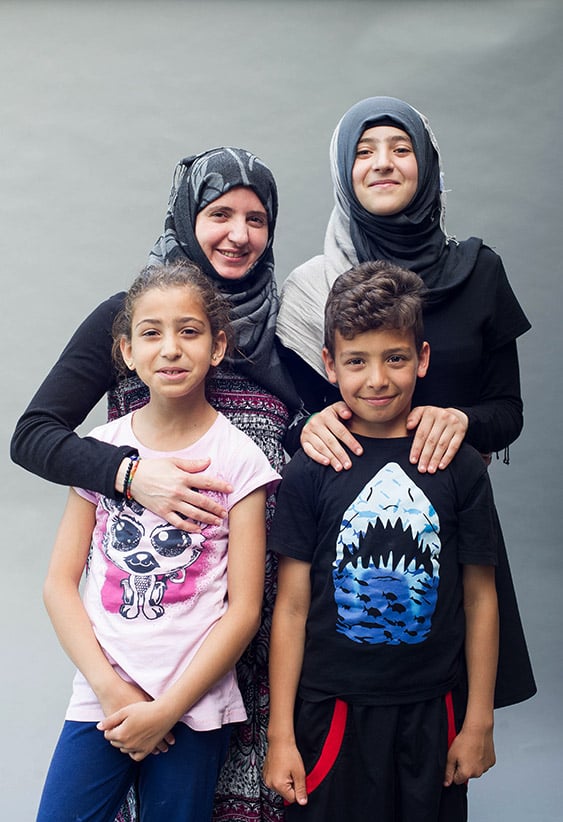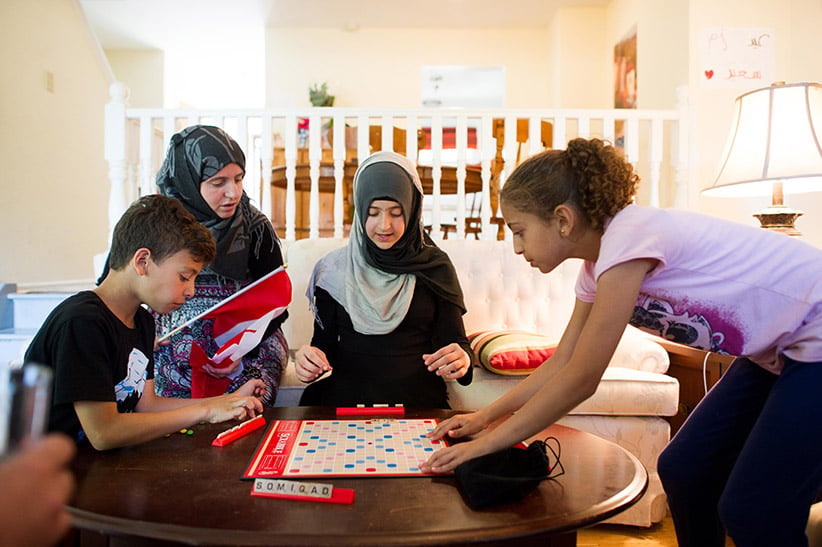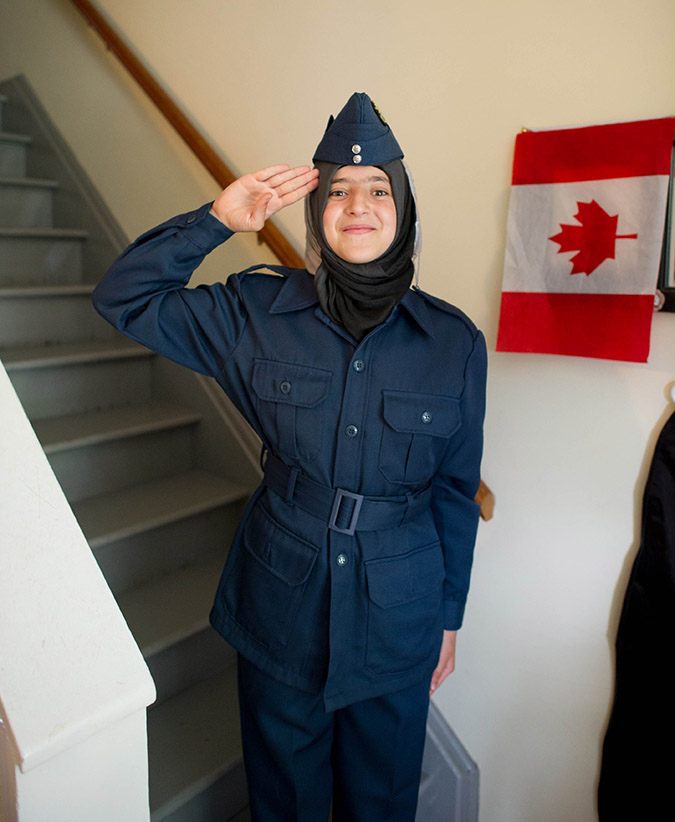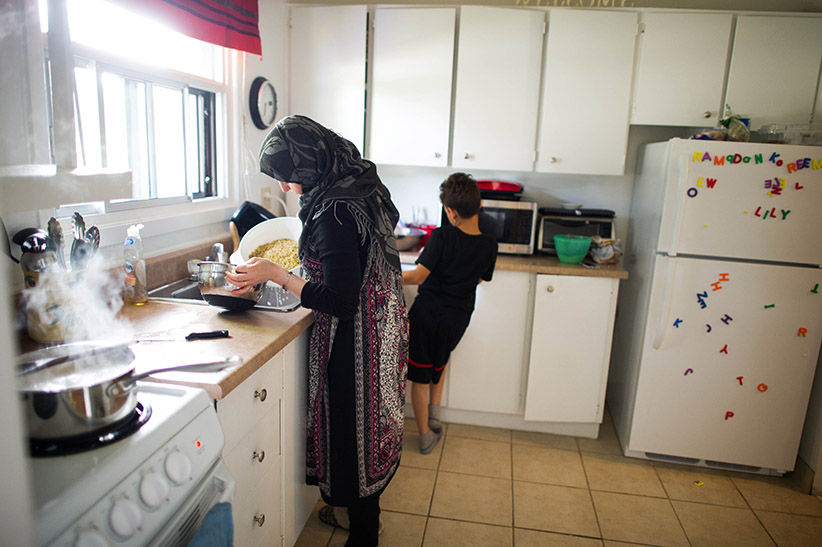Syrian refugee family 417, six months later
From a lonely existence as refugees to joy and community in Peterborough
The Alkhalaf family in Peterborough, ON nearly six months following their migration from Syria to Canada. (Photograph by Cole Garside)
Share

The song is called Watch Me—and watched it has been: nearly one billion times on YouTube, where the catchy hip-hop video, by American rapper Silentó, debuted last June.
“Now watch me whip,
Now watch me nae nae.
Now watch me whip whip,
Watch me nae nae.”
In Peterborough, Ont.—home to a few thousand of those YouTube clicks, at the very least—a 13-year-old girl is dancing in her living room, mimicking the moves from the video. Her name is Ansam Al-Debaijel, and she’s a few days away from finishing Grade 7. “Now watch me whip!” she sings, bobbing up and down in dark-blue jeans and a grey hijab. “Now watch me nae nae!” Her curly-haired little sister, nine-year-old Dalya, follows along beside her.
Their brother, Ibrahim, 10, is lounging on a nearby couch, far more interested in his iPad football game than an impromptu dance party. Directly behind him, looking down from an elevated dining room, is their mother, Amal Alkhalaf. She can’t help but smile at the scene.
“Now watch me whip whip,
Watch me nae nae.”
“Sometimes I still feel like it’s a dream,” she says.
It’s hard to blame her. Six months ago, this family of Syrian refugees—a single mother and her three kids—was holed up in a tiny, squalid apartment in Lebanon, their latest stop after years on the run (first from their home city of Homs, obliterated by Syria’s civil war, then from Islamic State-controlled territory in the north). After crossing into Lebanon in 2014, they survived largely on the generosity of friends and relatives. If the children ate a meal, it was a good day.
When Maclean’s first visited the family last December in Beirut, they were desperate for news. They knew the Canadian government had selected them for refugee resettlement, but nothing more. They had no idea when they would actually leave Lebanon—weeks? months?—and were beginning to doubt the day would come at all. “If they told me now to go to the airport, I would grab my children and go right now,” Amal told me then, speaking Arabic through a translator. “I would stay at the Canadian border. The most important thing is that I reach Canada.”
More than anything else about that visit, I will never forget Amal’s eldest daughter. Ansam had turned 13 only a few weeks earlier, and she was sitting on the floor of that crumbling apartment, her brother and sister beside her. “My only dream is to study,” she said via a translator, her voice barely a whisper. “I want to learn how to speak English, that’s it.” Then she buried her head between her knees, hiding tears.
Now here she is, on the other side of the world, dancing the nae nae—and speaking English as if she always has. Oh, and she also enlisted in Air Cadets, proudly sporting a crisp blue uniform with a matching hijab. “It is everything I wanted,” she says of her new life, no translator required. “It is not a dream right now. It is real.”
Surreal is the best way to describe their first few weeks in Canada. As thousands of fellow Syrians arrived by the planeload, this particular refugee family’s journey—and the strangers who banded together to help them—was the subject of a Maclean’s cover story: “Saving Family No. 417.” After the article appeared in January, Amal had a chance to briefly meet Prime Minister Justin Trudeau, using the opportunity to present him with a signed copy of the magazine—which he later tweeted. (“Family 417 is safe in Peterborough—and had a special gift for me,” he wrote, alongside a photo of the cover. “Welcome to Canada, Amal Alkhalaf.”)
The three children even enjoyed their own moment of YouTube fame, as tens of thousands clicked on a video of the kids enjoying the thrill of a Canadian toboggan ride.
Where they are today, however, is infinitely more heartwarming than any video could convey. Family 417 is safe and settled and thriving—grateful for the chance to celebrate their first-ever Canada Day. “I feel like I have been here 100 years,” Ansam says, her dance routine finished.

When I show her some old photos on my smartphone—including one of her inside that Lebanon apartment, her future unknown—she barely recognizes the girl. “Mom, do you believe this is me?” she says. “Oh my goodness, I don’t believe we lived in there.”
On paper, the story pitch seemed straightforward enough: tell the full tale of one refugee sponsorship, start to finish. Hundreds of private groups had mobilized to help displaced Syrians last fall after seeing that horrifying image of three-year-old Alan Kurdi, his little drowned body washed ashore. Chronicling the efforts of one Canadian group would provide a snapshot of the massive humanitarian response sweeping the country.
Which group would we profile? The choice was almost random.
The United Nations refugee agency (UNHCR) recommends the most vulnerable families for resettlement in Western countries. When Ottawa accepts one of those recommendations, that family is then matched, anonymously, with a willing sponsorship group under a program known as “blended visa office-referred,” or BVOR. When I googled the acronym back in November, one of the hits was a local TV-news item about a recently formed group called Salaam Peterborough.
Related: The Rajab family is home, at last
I sent an email to the address listed on the group’s GoFundMe page. The next morning, my phone rang; on the other end was Dr. Kristy Hiltz, a Peterborough veterinarian and mother of three. The ball was officially rolling. Days later, I would be introduced to the entire group: friends, and friends of friends, who had rallied together, via Facebook, to do their part.
As Canadians go, it is a diverse, inspiring collection. Hiltz’s husband, Dave McNab, is a crisis negotiator with the Ontario Provincial Police. Twelve others had signed on: Lise Fines, a Grade 7 teacher, and her husband, Rick Fines, a jazz and blues musician. Sisters Paulette Quinn, a fellow teacher at Lise’s school, and Lee-Anne Quinn, a decorated nurse practitioner who served 23 years in the Canadian Army (including a tour of duty in Afghanistan). Stephanie Melles, a Ryerson University ecology professor, and her husband Trevor Middel, a fisheries biologist. Retired spouses Myra Hirschberg and Tom Calwell, both contra dance instructors. Carla Gorman, another Grade 7 teacher who works with Lise and Paulette. Tom Whillans, a prominent environmental sciences professor at Trent University. And husband-and-wife biologists Brad Steinberg and Phung Tran—herself a refugee from Vietnam whose family was sponsored to come to Canada by a New Brunswick church nearly four decades ago.

Phung was still a baby when she and her parents fled the grip of Communism on a crammed, rickety boat, and the photos of Kurdi hit especially close to home. That could have been her. By joining the group, Phung told me, she could pay forward the generosity that saved her family all those years ago.
The people from Peterborough knew next to nothing about the Syrians they were sponsoring. All they had was a file number (BVOR 417) and a piece of paper listing their country of residence, names and ages: Amal Alkhalaf, then 41, and the three kids, 13, 10 and 8. (The children’s last name, Al-Debaijel, is their father’s; I would later learn that he disappeared in Homs sometime in 2011 and has not been heard from since.)
My plan was to travel to Lebanon in the hope, however slim, of tracking down this family of Syrian refugees—four among the many millions who had fled for their lives. I never could have predicted that my arrival at their door would mean as much to them as it did to me.
It was Canada’s ambassador to Lebanon, Michelle Cameron, who ultimately helped me locate the family. Because they were already listed in the government’s queue (again, accepted for resettlement after a recommendation by the United Nations), the embassy had Amal’s cellphone number on file. When a staffer called her on my behalf, Amal immediately agreed to meet.
Physically reaching her, however, proved yet another hurdle. Though Sunni Muslims, the family lived in the largely Shia municipality of Bourj el-Barajneh, where Hezbollah enjoys widespread sway and influence—and where, just three weeks earlier, a pair of Islamic State suicide bombers had targeted a bustling market district, killing 47 civilians. Post-attack, Hezbollah was especially wary of outsiders, and Maclean’s needed permission from the group’s central press office just to enter the neighbourhood. Passing through an armed checkpoint, we were specifically warned not to film or photograph outside.
Amal met us on a street corner, steps from where the bombers had struck. Dalya was nestled into her waist, gripping tightly.
After walking to her apartment and stepping inside, Amal had nearly as many questions for me as I did for her. She didn’t know that a group of private citizens was raising money to fund her family’s resettlement, and the word “Peterborough” meant nothing to her. When I handed her a small gift from the group—four tiny pins depicting the Canadian flag—she placed her hand over her heart. “This is like a trophy for me,” she said. “It is an honour to get the flag. I don’t know how I can express my thanks.”
She asked if I knew when they would fly to Canada. I had no idea, of course, but I promised to pass along her number to the people back in Peterborough. Maybe they could find out more, I told her.
“Thank you very much,” Amal replied. “I appreciate the hard work you did to contact me.”
Four weeks later, I saw the family again: stepping off a bus outside a Toronto-area hotel. It was Dec. 30, 2015, and they had just touched down at Pearson International Airport. Some of their sponsors were waiting nervously in the hotel lobby, rushing outside to hug them as soon as they caught a glimpse.
Ibrahim noticed me in the crowd and flashed a wide grin. Ansam smiled, too, touching the little Maple Leaf pinned to her jacket.
Until this afternoon—the day of the living-room dance routine—I had not seen Family 417 since their arrival in Canada. Home is now a rented three-bedroom townhouse directly across the street from the children’s school (St. Paul’s, the same school where three of their sponsors, Lise, Paulette and Carla, are teachers). When I knock on the front door, Dalya answers.
“Uncle Michael!” she says.
From the kitchen, Amal waves and smiles. “Hello,” she says. Her command of English is nowhere near the level of her children’s—they are close to fluent—but she is improving by the day, thanks to morning language classes at Fleming College.
“Coffee?” she asks.

As the children show me around, one thing stands out: their sponsorship group has lived up to its commitment, and then some. Donated furniture fills the home, in stark contrast to their windowless Lebanon apartment, which didn’t have a single table or chair. Each child has a new bicycle parked in the basement, and their own bed upstairs. Hanging above the flat-screen television is a stunning black-and-white sketch of Amal, drawn by a sponsor’s friend. Also on display is a large, framed photograph, a panoramic shot of the kids skating on a Peterborough lake for the first time.
Near the front door, a small Canadian flag hangs from a mirror.
“How are things?” I ask Ibrahim.
“Everything is awesome,” he replies, singing the chorus from The Lego Movie theme song.
Dalya? “I’m very happy,” she replies.
They are also very happy to see me, it turns out. I went searching for Amal and her children in the pursuit of journalism. They were the cornerstone of a story I was trying to tell, a story that would help Canadians better understand the plight of Syrian refugees, and our country’s collective desire to help them. But in their eyes, I was something else entirely: confirmation. Proof that they were indeed coming to Canada. Proof that they would one day live in peace.
“After you came, my mom said to us: ‘I believe we are going to Canada,’ ” Ansam says, sitting with the others around the dining-room table. “ ‘Maybe today, maybe tomorrow, maybe after tomorrow—but soon.’ ”
“I am sure,” Amal adds, using her English once again.
In hindsight, my visit might have helped speed up their departure. After I shared Amal’s phone number with the group, and they spoke for the first time, the sponsors discovered that the family’s medical exams, necessary to clear the final approval process, had been booked—but that word of the appointment had somehow not reached the family. A few calls later, the group ironed out the wrinkle and the medicals were rescheduled.
“If we hadn’t been able to talk to her, we wouldn’t have had a clue that any of this was going on,” Lise told me. “She would still be sitting there.”
Would that bureaucratic hiccup have fixed itself? Probably. Nevertheless, Amal is convinced that my surprise visit somehow helped pave the way for their speedy departure. It is why her children, raised to be respectful, call me “Uncle Michael” (even though I know I played only a bit role, if any, in helping them reach Canada when they did).
But this much is certain: I had the privilege of following them on this journey—of telling their story—and to see them today is definitely an emotional reunion. Simply put, I could not be happier for them.
Ansam says she wants to be a teacher, like Auntie Lise and Auntie Paulette and Auntie Carla. (“My favourite subject is mathematics,” she says. “We’re doing probability and algebraic expression.”) Ibrahim dreams of being a soccer star, or maybe a baseball player; he is already a diehard Toronto Blue Jays fan. Dalya, the youngest, hopes to be a police officer. (As soon as Dave McNab heard that one, the OPP veteran made sure to bring one of his female colleagues to see her—to show Dalya that in Canada, a woman can indeed grow up to be a police officer.)
“For me, the most amazing thing has been to hear the kids talking about how they have hopes and dreams for careers,” Dave says. “Months before, they couldn’t possibly have dreamed that.”
For his wife, Kristy Hiltz, one specific memory stands out. “It was probably within a week of their arrival, and I was sitting trying to communicate with Amal over the iPad using Google Translate,” she recalls. “Dalya was singing, and it took me a few seconds before I realized that she was singing our national anthem to me. Needless to say, the tears were streaming down my face. That will stay with me for the rest of my life.”
Sitting at the dining-room table, Dalya and Ansam start to sing it again.
“O Canada,
Our home and native land.
True patriot love, in all thy sons command.”
It may be the most beautiful performance I’ve ever heard. Silentó has nothing on them.
As the clock approaches 6 p.m., Lee-Anne Quinn arrives at the door. She is here to drive Ansam downtown to pick up her new Air Cadets jacket. (The previous one didn’t quite fit.) “Did Auntie Paulette give you the paper?” Ansam asks, referring to Lee-Anne’s sister.
“Yes, hon,” she replies.
They aren’t gone for long, and when they return, Ansam runs upstairs to try on the entire uniform. When she emerges a few minutes later, everything fits perfectly.
Lee-Anne, forever a soldier, beams with pride. “Being ex-military, of course, I’ve always been very patriotic and love my country; I went to war for my country,” she says. “That I can help this family—over here, in Canada—it’s probably the happiest moment of my life.”
The next morning, I offer to drive Amal to her daily English class. She usually takes the bus, leaving at 7:45 a.m. to make it for 9, but by car, an 8:30 a.m. pickup leaves plenty of time for the commute. Amal emerges from the house with a black-and-white backpack over her shoulder.
The language barrier limits our conversation, but we get by. I tell her it’s funny that her children simply cross the street to get to school, while she needs to endure a long bus ride.
“Two buses,” she says, correcting me.
At one point, we drive past a house made entirely of logs. “Very nice,” I say.
“I like Peterborough,” she replies.
Where will Amal Alkhalaf be in another year? Five years? It’s impossible to say. But in the meantime, her family is taking full advantage of the opportunity they’ve been handed. Not once has Amal missed a class.
As we approach Fleming College, she points me in the direction of her building. Class begins in a few minutes. “Thank you,” Amal says, opening the door. “Thank you.”
Thank you.